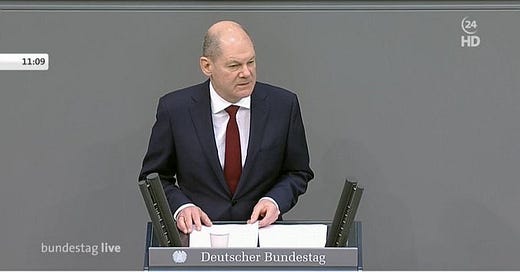Has Scholz Ended German “Wandel durch Handel” Foreign Policy?
Chancellor Olaf Scholz has spent the last week breaking one German foreign policy taboo after another—and decades of political tradition.
The German word “Zeitenwende” refers to a historical turning point—the beginning of a new era. And on Sunday, Olaf Scholz did no less than tell the German Bundestag how Russia’s invasion of Ukraine will completely upend German foreign policy.
It’s hard to imagine his predecessor, Angela Merkel—a politician noted for her caution and never straying too far beyond German public opinion—giving a similar speech. Yet, only a few months ago, Scholz campaigned partly by channeling Merkel. He was her Vice-Chancellor and represented her brand of stable continuity. German voters bought it.
Now we’re seeing a very different Scholz—a Chancellor undertaking the task of leading Germans through a complete change in the way it engages with the world around it. Scholz hinted at a Germany that was less pacifist, better equipped militarily, and ready to use the political and economic might it usually inertly sits on to defend Europe, the free world, and the liberal international order.

So will Germans follow Scholz?
Germany’s allies may well say, and not without justification that “it’s about time!” But it’s also important to understand that what the Chancellor is asking his public to do is enormous.
Changing Germany’s pacifist self-image
Germany’s self-image is that of a reformed country with a violent history that typically eschews even military readiness—to say nothing of actually using force. In the weeks leading up to Russia’s invasion of Ukraine, this manifested itself in moral high ground positions that allies saw as naïve, but that even Russia hawks like Foreign Minister Annalena Baerbock justified for historical reasons. Only a month ago, 73 percent of Germans were against arming Ukraine. Scholz wouldn’t even let Estonia send German-made artillery. Baerbock maintained that “our restrictive arms export policy is based on our history.”
And now Germany isn’t just letting allies like Estonia send German-made equipment. It’s sending its own and voting in favour of EU funding for fighter jets to be sent to Ukraine—itself a completely unprecedented step. It’s even going to meet NATO’s target of spending 2 percent of its GDP on defense—something that was a subject of hot debate in Germany during Trump’s time in the White House. We’ve seen years of politicians across Germany’s political spectrum claiming that the Nordstream 2 pipeline to deliver gas directly from Russia was purely a commercial project—and not the Russian geopolitical instrument German allies like Poland warned it was. Only a month ago, close to 60 percent of Germans supported its continuation. Experts estimated it was around 95 percent completed.
And then Scholz essentially killed it at one morning press conference.

He then proceeded to instruct his ministries to revise Germany’s energy security strategy and pledged to create LNG ports that would allow gas to be shipped in. Suddenly, Germany was recognizing that the “purely commercial” was, in fact, geopolitical. International observers might well ask how the pipeline got so far along before it was stopped—but few high-ranking German politicians have previously acknowledged the geopolitical aspects of Nordstream 2. Now that a sitting Chancellor has done so, it’s hard to go back. Make no mistake, it’s a big step domestically.
Diplomacy over Deterrence—the German security tradition
If you want to understand why that’s the case, it’s helpful to look at how German elites view “national security” and why.
The concept has different nuances in Germany than in countries like the US or UK, in which a strong military for the purpose of deterring potential aggressors plays a central role. By contrast, German security and defense expert Ulrike Franke recently argued that many Germans simply don’t understand the concept of deterrence. In much of German thought, peace and security is rather achieved through diplomatic engagement. The German concept of “Wandel durch Handel,” or “change through trade,” involves turning trading partners into friends who increasingly come around to sharing democratic values over time. Understanding this concept is key to understanding the previous foreign policy tradition Scholz is now signaling a break from.


In my previous blog on how Germany perceives its own history, I came out rather strongly against previous German attempts to apply “Wandel durch Handel” to Putin and China. But to many Germans, the EU stands as a prime example of how successful the concept can be. Countries that used to fight each other nearly constantly now share a common currency and negotiate trade agreements as a bloc. Their citizens have the right to live, work, do business, and study in each other’s countries. EU countries are so economically integrated that war between them is essentially impossible. Of the nine countries Germany shares a land border with, eight are in the EU. The ninth, Switzerland, has a high level of integration with the EU. Beyond its tradition of objecting to military force on moral grounds, modern Germany is a country that largely secured its nine land borders through trade, diplomacy, and commercial interdependence. For a country lacking the geographical advantages the UK or US have in their own national defense—it is a remarkable historical achievement.
“Wandel durch Handel” has no doubt been used as a cover for prioritizing short-term commercial interests with authoritarian regimes like Russia and China—instead of upholding liberal values or addressing longer-term strategic questions. But that doesn’t mean there aren’t a sizeable number of Germans—both regular citizens and elites—who truly believe in the concept and think it can be applied further.
We’re about to find out the extent to which Vladimir Putin’s invasion of Ukraine has shattered Wandel durch Handel illusions—both among Germany’s political elite and the public at large. As Ukraine valiantly fights one of the deadliest militaries in the world—no one yet knows how far Scholz can lead Germany to its oft-stated goal of peace in Europe.
But he’s certainly not taking the easy way out.







